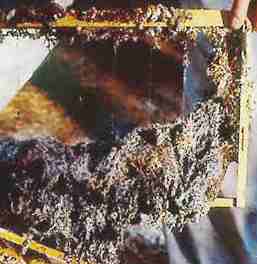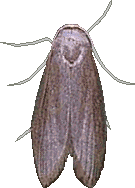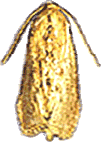

Lesser Wax Moth Achroia grisella (near right) is not much problem in my area. It is said not to attack virgin comb, but it does, although it prefers comb that has had brood in. I have seen super combs that have been stored for some time that have been destroyed. Rotating supers, so what hasn't been on the bees one year are first on the next will adequately deal with it.

Greater Wax Moth Galleria mellonella (left) in my experience does far more damage than lesser wax moth. It's larvae are so voracious and numerous that they can wreak massive damage in a short time, especially in warm weather. The lasting damage to hive woodwork is also much more severe than for the lesser species.
The debris has an unpleasant smell, cleaning up the damage takes valuable time and the wax itself is lost as a product.
In a natural nest wax moth perform a very useful function. When a colony dies out and the nest is not occupied immediately by a new swarm, wax moth will quickly destroy the combs, leaving a clean cavity for a new swarm to build a new nest. If the colony that died out was diseased the infection would be destroyed.
Beekeepers often consider the wax moth a nuisance. In stored brood combs they can quickly destroy combs. In a colony the lesser wax moth is no problem, but the larvae of the greater wax moth can tunnel under brood cappings, which shows in a white line. These result in what is called bald brood. In general wax moths are only a big problem in weak colonies, or those that are neglected.
The links above left will give you a good idea of how to deal with them, but do not expect to be able to eliminate them entirely, however by observing hygiene and being vigilant you will reduce the damage that they cause to an acceptable level. Those beekeepers who claim that wax moth will kill colonies are probably trying to cover up their own miss-management. Strong, well managed colonies will themselves do most of the work required to limit the pest.
Originally written by Dave Cushman. Edited by Roger Patterson.